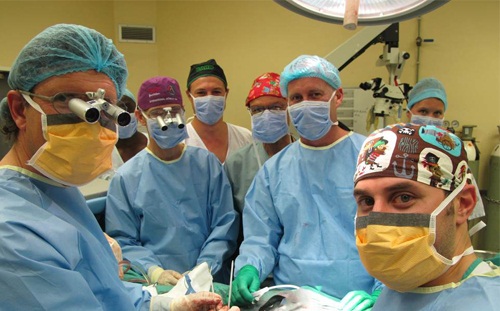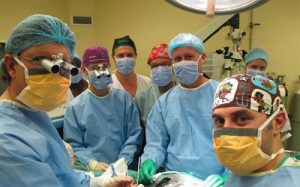The team of doctors at who carried out the first successful penis transplant have been inundated with requests from men around the world who want to have the operation.
South African doctors have successfully performed the world's first penis transplant on a 21-year-old man whose organ had been amputated three years ago after a botched circumcision.
Reuters Health reports that the nine-hour operation, which took place in December, was part of a pilot study by Tygerberg Hospital in Cape Town and the University of Stellenbosch to help the 250 or so young South African men who lose their penises each year after coming-of-age rituals go wrong.
Doctors said the patient, who was not named, had already recovered full urinary and reproductive functions, and that the procedure could eventually be offered to men who have lost their penis to cancer or as a last resort for severe erectile dysfunction.
"Our goal was that he would be fully functional at two years and we are very surprised by his rapid recovery," Andre van der Merwe, the head of the university's urology unit who led the operation, said.
Each year thousands of young South African men, mainly from the Xhosa tribe, mark their passage into manhood by shaving their heads and smearing themselves with white clay from head to toe, living in special huts away from the community for several weeks, and then undergoing ritual circumcision. But in May 2013, more than 20 youths died after initiation rituals in the northerly Mpumalanga province, prompting rare cross-party calls for reform of a traditional practice.
The South African government has promoted medical circumcisions over the less safe traditional practices. Last year, the Department of Health said it was studying a non-surgical, disposable circumcision device that it believed could also provide a safer alternative.
News24 reports that according to the Stellenbosch University Faculty of Medicine and Health Sciences (SU FMHS), as part of the study, nine more patients will receive penile transplants. SU said that this procedure could eventually also be extended to men who have lost their penises from penile cancer or as a last-resort treatment for severe erectile dysfunction due to medication side effects.
"It’s the first time success was achieved with such a procedure," the unit said. "South Africa remains at the forefront of medical progress," said Professor Jimmy Volmink, dean of SU's FMHS. "This procedure is another excellent example of how medical research, technical know-how and patient-centred care can be combined in the quest to relieve human suffering. It shows what can be achieved through effective partnerships between academic institutions and government health services."
The operation was the first time a successful long-term result was achieved, after one previous attempt failed. "Our goal was that he would be fully functional at two years and we are very surprised by his rapid recovery," says van der Merwe. Van der Merwe was also assisted by Professor Frank Graewe, head of the division of plastic reconstructive surgery at SU FMHS, and Professor Rafique Moosa, head of the FMHS department of medicine, as well as other support staff.
"It's a massive breakthrough. We've proved that it can be done – we can give someone an organ that is just as good as the one that he had," says Graewe. "It was a privilege to be part of this first successful penis transplant in the world.
The team of doctors said there was extensive discussion about whether the operation, which is not life-saving in the same way as a heart transplant, was ethical, reports BBC News. There have been attempts before, including one in China. Accounts suggested the operation went fine, but the penis was later rejected.
The South African man was 18 and already sexually active when he had the circumcision and was left with just 1cm of his original penis. Doctors say South Africa has some of the greatest need for penis transplants anywhere in the world. Dozens, although some say hundreds, of boys are maimed or die each year during traditional initiation ceremonies.
Van der Merwe, who normally performs kidney transplants, is quoted as saying: "This is definitely much more difficult, the blood vessels are 1.5 mm wide. In the kidney it can be 1 cm."
The team used some of the techniques that had been developed to perform the first face transplants in order to connect the tiny blood vessels and nerves. The procedure required a lot of preparation – the team needed to be sure the patient was aware of the risks of a life-time of immunosuppressant drugs. Also some patients cannot cope with a transplant if they fail to recognise it as part of their body.
"Psychologically, we knew it would have a massive effect on the ego," said van der Merwe. It took "a hell of a lot of time" to get ethical approval, he added. One of the concerns is a heart transplant balances the risk of the operation against a certain death, but a penis transplant would not extend life span. Van der Merwe said: "You may say it doesn't save their life, but many of these young men when they have penile amputations are ostracised, stigmatised and take their own life. "If you don't have a penis you are essentially dead, if you give a penis back you can bring them back to life."
Another nine patients have now been lined up to have the operation.
“Western Cape Government Health (WCGH) is very proud to be part of this ground-breaking scientific achievement,” says Dr Beth Engelbrecht, head of the WCGH. “We are proud of the medical team, who also form part of our own staff compliment at Tygerberg Hospital. It is good to know that a young man’s life has been significantly changed with this very complex surgical feat. From experience we know that penile dysfunction and disfigurement has a major adverse psychological effect on people.”
In Forbes, however, a US urologist has dismissed the talk of a ‘breakthrough’, saying that the circumstances of the patients requiring such surgery made it unlikely to unlikely to make it a common procedure in the future, since they lived in medically inaccessible areas unable to deliver the necessary aftercare.
Each year thousands of young South African men, mainly from the Xhosa tribe, mark their passage into manhood by shaving their heads and smearing themselves with white clay from head to toe, living in special huts away from the community for several weeks, and then undergoing ritual circumcision. But in May 2013, more than 20 youths died after initiation rituals in the northerly Mpumalanga province, prompting rare cross-party calls for reform of a traditional practice.
In other penile research, MedPage Today reports that Dr David Veale and colleagues at King's College, London reviewed studies of penis measurements for more than 15,000 men, the largest collection yet, to come up with a graph that can be shown to men who wonder, or obsess over, how theirs measure up.
The results show that across 17 studies, penis length was inconsistently and weakly correlated with digit ratio, BMI, testicular volume, and age. But body height was a different story – four studies found a correlation between flaccid stretched length or erect length, and height (r ranged from 0.21 to 0.61).
Veale and colleagues said it could be useful in the construction of a nomogram, or a comparison graph. "It may also be of academic interest – for example to investigate the discrepancy between individuals' perceived and actual penis size," they wrote. Also, they added, to get a closer look at how penile dimensions and condom failure are related.
Not everyone seeing the study was impressed, though. "I don't see this as a particularly useful study," Dr Benjamin Davies, an assistant professor of urology at the University of Pittsburgh School of Medicine, is quoted in the report as saying. He wasn't, he said, at all interested in the study, and doesn't have any patients asking questions about it. "Penises are of all sizes – I can confirm that for you. And if you stretch on them, they get longer."
But he said that the study's results could keep potential patients from turning to some of the weirder solutions on the darker corners of the web: grapefruit, vacuum devices, creams, and pills, all promising to increase manhood. "Being worried about size, or having body dysmorphic disorder that is focused on penis size, when it becomes a preoccupation, leads many men to see unhelpful solutions with all sorts of lotions, potions, extenders, surgery – none of which have any evidence base," said Veale.
What drew Veale to studying small-penis anxiety was the lack of evidence for it, he said. "We need to develop and evaluate a psychological therapy for such men." With this, Davies agreed. "I think that people who have real psychological problems with length, they should seek counsel with psychiatrists, not really urologists," he said.
Studies of congenital or acquired penis abnormality were excluded, as were studies of men who complained about small penis size or erectile dysfunction, and men who had previously undergone penis surgery. In all included studies, measurements were taken by a health professional using a "standard procedure," with a minimum of 50 participants, all of whom were 17 or older. The results couldn't be broken down by race because there weren't enough studies.
In one study, mentioned but not included in the review, more than 1,500 men had both longer and bigger flaccid and erect penises compared with other studies. But those data were self-reported. The authors of that study argued that, since the data were reported anonymously over the Internet with the intention of getting a proper-fitting condom, their model was more accurate.
Unsurprisingly, there was less reliability when measuring penile stretched length as opposed to flaccid length. "There is therefore a greater risk of bias in measuring the stretched length if insufficient pressure is applied and the greatest need for training and measuring inter-rater reliability," wrote the authors. In other words, researchers weren't tugging hard enough. The authors of the review had recommendations for those doing the measuring in future studies. "We recommend privacy in an air-conditioned consulting room at a constant temperature (21°C) at sea level," they wrote. They were careful to point out that a disposable tape measure should be used.
[link url="http://www.news24.com/SouthAfrica/News/Penis-transplant-Surgeons-inundated-with-requests-20150317"]Full News24 report[/link]
[link url="http://www.reuters.com/article/2015/03/13/us-safrica-penis-transplant-idUSKBN0M91YN20150313"]Full Reuters Health report[/link]
[link url="http://www.news24.com/SouthAfrica/News/Nine-more-to-receive-penis-transplant-university-20150313"]Full News24 report[/link]
[link url="http://www.sun.ac.za/english/Lists/news/DispForm.aspx?ID=2328"]Stellenbosch University material[/link]
[link url="http://www.news24.com/Live/SouthAfrica/News/We-speak-to-the-experts-who-performed-the-worlds-first-successful-penis-transplant-20150313"]Full News24 interview[/link]
[link url="http://www.forbes.com/sites/benjamindavies/2015/03/13/penis-transplant-not-a-breakthrough-yet/"]Forbes full report[/link]
[link url="http://www.bbc.com/news/health-31876219"]Full BBC News report[/link]
[link url="http://www.medpagetoday.com/Urology/Urology/50278"]Full MedPage Today report[/link]
[link url="http://onlinelibrary.wiley.com/doi/10.1111/bju.13010/abstract;jsessionid=B240781255682CD6394F7BB4125C9EDE.f01t04"]BJU International abstract[/link]


